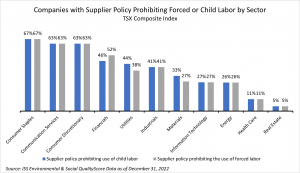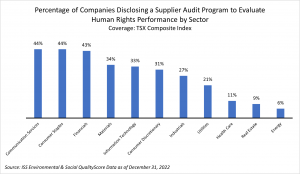
DATE PUBLISHED: July 12, 2023
Canada Regulatory Update: New Reporting Requirements on Modern Slavery
Most of the companies traded on Canada’s benchmark TSX index have not taken initial steps to proactively implement corporate supplier policies and programs that may mitigate compliance risks with future regulations under the Act. In some industries, less than 50% of companies have established a supplier policy prohibiting forced labor or child labor and the majority of companies have not implemented a supplier audit program.
In May, Canada’s House of Commons adopted Bill S-211, an Act to enact the Fighting Against Forced Labour and Child Labour in Supply Chains and to amend the Customs Tariff (the Act). The Act requires certain government institutions and business entities to report annually on their efforts to prevent or reduce the likelihood of forced labor and child labor playing a part in their supply chains.
With this Act, Canada joins a global effort to combat and eradicate modern slavery in supply chains, led by regulations such as the U.K.’s Modern Slavery Act 2015[1], the German Act on Due Diligence in Supply Chains, and the EU’s Corporate Sustainability Due Diligence Directive (“CSDDD”).
Modern slavery encompasses practices such as forced labor, human trafficking, child labor and other forms of coerced labor and exploitation. As these practices are considered violations of human rights, stakeholders already expect companies to mitigate and prevent these risks. However, with the Act formalizing and mandating these expectations, companies will need to pay greater attention to their human rights programs. In this report, ISS Corporate Solutions (ICS) highlights key elements of the Act and provides insights into current market alignment with selected disclosure requirements.
Highlights of the Act
Scope and Applicability
The Act applies to:
- Any business entity that:
- Produces, sells, or distributes goods in Canada
- Imports goods into Canada
- Controls an entity engaged in either of the above activities
- And satisfies the following specific criteria:
- The company is listed on a stock exchange in Canada
- The company has a place of business in Canada, does business in Canada, or has assets in Canada and meets at least two of the following conditions for at least one of its two most recent financial years:
- has at least $20 million in assets,
- has generated at least $40 million in revenue, and
- employs an average of at least 250 employees.
Companies covered under the new regulation are required to create an annual report following the requirements below.
Requirements
The report must outline steps the entity has taken during the previous fiscal year to prevent and reduce the risk that forced labor or child labor may have been used at any step of the production of goods in Canada or elsewhere by the entity or of goods imported into Canada by the entity. The report must be approved by the entity’s governing body and should include the following information:
- The company’s structure, activities, and supply chains
- The company’s policies and its due diligence processes in relation to forced labor and child labor
- The parts of the business and supply chains that carry a risk of forced labor or child labor and the steps it has taken to assess and manage that risk
- Any measures taken to remediate any forced labor or child labor
- Any measures taken to compensate the loss of income to the most vulnerable families that results from any measure taken to eliminate the use of forced labor or child labor in its activities and supply chains
- The training provided to employees on forced labor and child labor
- How the company assesses its effectiveness in ensuring that forced labor and child labor are not being used in its business and supply chains
Timing and Availability
- The Act will take effect on Jan. 1, 2024.
- Companies are expected to submit the first Annual Report to the Minister of Public Safety and Emergency Preparedness on or before May 31, 2024.
- The annual reports will be made available to the public through the Department of Public Safety and Emergency Preparedness website.
Current Market Alignment
Using ISS Environmental & Social QualityScore data, ICS analyzed the Canadian market’s current alignment with three disclosure factors linked to modern slavery:
- Does the company disclose a supplier policy that prohibits the use of child labor?
- Does the company disclose a supplier policy that prohibits the use of forced labor?
- Does the company disclose an audit program to evaluate its suppliers’ performance in the area of human rights (including human trafficking and slavery)?
Companies in the Materials, Industrials, Consumer Discretionary, and Consumer Staples sectors appear more likely to be subject to the Act’s conditions and therefore may have a higher exposure to reporting obligations than other companies. However, several other sectors will likely be subject to the requirements as well.
Supplier Policies
Companies in the Consumer Staples, Communication Services, and Consumer Discretionary sectors have the highest disclosure rates on supplier policies. Disclosure rates of in several sectors are well below 50%, as many companies have yet to communicate actions and programs addressing child and forced labor risks in their supply chain.
Supplier Audit Program on Human Rights
The Communication Services and Consumer Staples sectors demonstrate higher levels of disclosure related to the implementation of a supplier audit program, with approximately 44% of companies reporting the relevant information. The majority of Canadian companies have not disclosed the presence of a supplier audit programs, which assess supplier performance in human rights, leaving significant ground to cover, as such disclosures are part of the reporting obligations under the Act.
Next Steps for Companies
Companies will be expected to prepare and submit their first annual report by the end of May next year. Corporate issuers can take immediate steps to address any gaps in their supply chain risks including:
- Assessing business activities to determine the applicability of the Act
- Developing and publishing a robust Code of Vendor Conduct outlining the company’s expectations of its suppliers and vendors with respect to forced or child labor
- Conducting a risk assessment of the company’s supply chain to identify any business activities or geographic regions that expose them to forced or child labor
- Providing training opportunities for employees to recognize forced or child labor
HOW CAN ISS CORPORATE SOLUTIONS HELP?
The ICS Sustainability Advisory team can support companies in identifying gaps in corporate reporting, find opportunities to improve disclosures and prepare a strategy to help issuers to comply with the new requirements. Utilizing ISS ESG’s Modern Slavery Scorecard, ICS can also conduct Supply Chain Assessments to determine exposure to modern slavery risks.
Notes:
[1]https://www.legislation.gov.uk/ukpga/2015/30/contents/enacted



